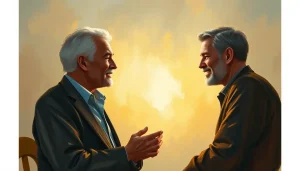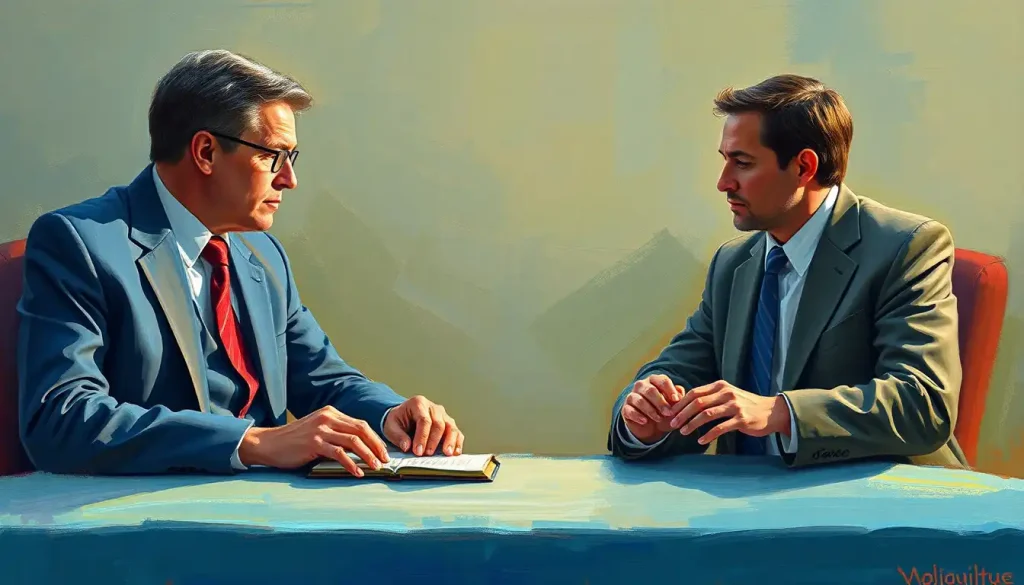Trust, a delicate thread woven through the fabric of human existence, can either fortify our spirits or leave us vulnerable to the crushing weight of misplaced faith. This paradoxical nature of trust forms the foundation of an age-old wisdom, encapsulated in the profound biblical phrase, “Cursed is the man who trusts in man.” These words, penned centuries ago, continue to resonate with startling relevance in our modern world, challenging us to examine the very essence of our relationships, beliefs, and the foundations upon which we build our lives.
Originating from the Book of Jeremiah in the Old Testament, specifically Jeremiah 17:5, this cautionary statement serves as a stark reminder of the potential pitfalls that await those who place their ultimate trust in fallible human beings. The prophet Jeremiah, known for his unflinching delivery of divine messages, uttered these words during a tumultuous period in Israel’s history. His warning echoed through the corridors of time, finding new meaning and application in each successive generation.
To truly grasp the significance of this biblical wisdom, we must first delve into its original context. The ancient Israelites, like many societies throughout history, faced the constant temptation to rely on human strength and ingenuity rather than divine guidance. This reliance on mortal power often led to disastrous consequences, both on personal and national levels. Jeremiah’s words served as a wake-up call, urging his people to reconsider their priorities and the object of their trust.
Unraveling the Biblical Tapestry: A Closer Look at Jeremiah 17:5-8
The full passage of Jeremiah 17:5-8 provides a vivid contrast between the fate of those who trust in man and those who trust in God. It paints a poetic picture of two trees: one withering in the desert, representing the person who relies on human strength, and the other flourishing by the water, symbolizing the individual who places their trust in the divine.
This imagery is not isolated within the scriptures. Throughout the Bible, we find numerous passages that echo this sentiment, warning against the dangers of misplaced trust while extolling the virtues of faith in a higher power. From the Psalms to the Proverbs, the message is consistent: human beings, with all their strengths and capabilities, are ultimately limited and flawed.
The theological implications of this teaching are profound. It challenges us to examine the very nature of our faith and the foundations upon which we build our lives. Are we placing our ultimate trust in things that are temporary and fallible, or are we anchoring ourselves to something eternal and unchanging? This question lies at the heart of many religious and philosophical discussions, transcending cultural and denominational boundaries.
The Perils of Misplaced Trust: Lessons from History
History provides us with a sobering catalog of instances where misplaced trust in human authority has led to catastrophic outcomes. Political leaders, promising utopian visions and revolutionary change, have often led their followers down paths of destruction and despair. The 20th century alone witnessed the rise and fall of numerous ideologies that demanded unwavering loyalty from their adherents, only to crumble under the weight of their own contradictions and human fallibility.
Similarly, the realm of religion has not been immune to the dangers of misplaced trust. Charismatic figures and cult personalities have exploited the human need for belonging and purpose, often with devastating consequences. The stories of Jim Jones and the Peoples Temple, or the Heaven’s Gate cult, serve as chilling reminders of the potential for manipulation and abuse when trust is given without discernment.
In the financial world, we’ve seen how blind faith in human institutions can lead to economic turmoil. The global financial crisis of 2008 exposed the fragility of systems built on unchecked greed and misplaced confidence. Countless individuals saw their life savings evaporate, their trust in financial experts and institutions shattered in the aftermath.
These historical examples underscore the wisdom of Jeremiah’s words, reminding us that no human system or individual, no matter how impressive or promising, is infallible. The evolution and impact of trusts in American history also provides an interesting perspective on how we’ve attempted to manage and protect assets through human-designed structures, further illustrating our complex relationship with trust and authority.
The Psychology of Trust: A Double-Edged Sword
Despite the warnings against misplaced trust, the human need for connection and reliance on others is undeniable. We are social creatures, wired for relationship and interdependence. Trust forms the bedrock of healthy relationships, fostering cooperation, intimacy, and social cohesion. Without some level of trust in our fellow humans, society as we know it would cease to function.
However, this innate need for trust can also make us vulnerable. The psychological phenomenon of codependency illustrates how an excessive reliance on others for our sense of self-worth and identity can lead to unhealthy relationships and personal stagnation. Blind faith in another person’s judgment or character can leave us exposed to manipulation and disappointment.
The challenge, then, lies in striking a balance between healthy trust in human relationships and maintaining a sense of self-reliance and critical thinking. This balance is crucial for our emotional well-being and personal growth. It’s about recognizing the value of human connections while also acknowledging the limitations of human nature.
Navigating Trust in the Modern World: A Practical Approach
In light of these considerations, how can we apply the wisdom of “Cursed is the man who trusts in man” in our daily lives? The answer lies not in complete isolation or cynicism, but in developing a nuanced approach to trust and relationships.
Firstly, cultivating critical thinking skills is essential. In an age of information overload and “fake news,” the ability to discern truth from falsehood is more crucial than ever. This involves questioning our assumptions, seeking out diverse perspectives, and being willing to change our minds when presented with new evidence.
Secondly, developing spiritual discernment can provide a valuable compass for navigating complex moral and ethical landscapes. This doesn’t necessarily mean adhering to a specific religious doctrine, but rather cultivating an awareness of something greater than ourselves and our immediate circumstances. It’s about seeking wisdom that transcends human limitations and cultural trends.
Lastly, building a foundation of faith that extends beyond human capabilities can provide stability in an ever-changing world. This foundation might be rooted in religious beliefs, philosophical principles, or a deeply held set of values. The key is that it offers a reference point outside of ourselves and other fallible human beings.
From Human Trust to Divine Faith: A Transformative Journey
For many, the journey from trusting primarily in human strength to placing faith in a divine power is a profound and transformative experience. The Bible is replete with promises for those who trust in God, offering assurances of peace, guidance, and ultimate fulfillment. These promises stand in stark contrast to the potential curses associated with misplaced human trust.
Countless testimonies throughout history speak of lives transformed through faith. From ancient figures like the Apostle Paul to modern-day individuals overcoming addiction or finding purpose in the midst of suffering, these stories offer compelling evidence of the power of trust placed in something beyond human capability.
For those seeking to shift their trust from man to God, practical steps might include:
1. Regular self-reflection and honest assessment of where we’re placing our ultimate trust
2. Studying religious or philosophical texts that offer wisdom on trust and faith
3. Engaging in practices like prayer, meditation, or mindfulness to cultivate spiritual awareness
4. Seeking community with others who are on a similar journey of faith and trust
5. Actively looking for opportunities to trust in divine guidance rather than relying solely on human wisdom
It’s important to note that this shift in trust doesn’t negate the value of human relationships or expertise. Rather, it places them in proper perspective, recognizing their worth while also acknowledging their limitations.
The Paradox of Trust: Balancing Human Connections and Divine Faith
As we navigate the complex landscape of trust in our modern world, we find ourselves faced with a paradox. On one hand, we’re cautioned against placing our ultimate trust in fallible human beings. On the other, we’re called to engage in meaningful relationships and contribute positively to our communities.
The resolution to this paradox lies in understanding the different levels and types of trust. There’s a vast difference between trusting someone to complete a task or keep a confidence, and trusting them for our ultimate sense of security and identity. The former is necessary for functioning in society, while the latter can lead to the “curse” warned about in Jeremiah.
This nuanced understanding of trust allows us to engage fully in human relationships while maintaining a healthy perspective on their limitations. It enables us to appreciate the strengths and contributions of others without elevating them to an unrealistic pedestal. In essence, it allows us to love and trust our fellow humans while reserving our ultimate faith for something greater.
Trust in Business and Finance: A Practical Application
The principles we’ve explored regarding trust have significant implications in the realms of business and finance. The concept of trusts, for instance, illustrates how we’ve attempted to create legal structures to manage assets and relationships based on trust. Understanding the construction of trusts and their role in financial planning can provide valuable insights into how we navigate issues of trust in practical, everyday situations.
Similarly, the role of investment advisors for trusts highlights the delicate balance between relying on human expertise and maintaining a critical, discerning approach to financial decisions. While these professionals can offer valuable guidance, the wisdom of “Cursed is the man who trusts in man” reminds us to approach such relationships with a healthy dose of skepticism and personal responsibility.
It’s also worth noting the potential disadvantages of trusts in business, which serve as a reminder that no human-designed system is perfect. These limitations underscore the importance of maintaining a balanced perspective and not placing blind faith in any single financial strategy or institution.
Spiritual Inheritance: A Legacy of Faith
As we consider the implications of trust and faith in our lives, it’s natural to think about the legacy we leave for future generations. The concept of spiritual inheritance offers a powerful framework for passing down not just material wealth, but also values, beliefs, and a foundation of faith to our descendants.
This spiritual legacy can serve as a bulwark against the temptation to place ultimate trust in human systems or individuals. By instilling in our children and grandchildren a sense of something greater than themselves, we equip them with the tools to navigate the complex landscape of trust and relationships in their own lives.
Trust in the Workplace: Empowering Without Overreaching
The principles we’ve explored also have significant implications for leadership and management in professional settings. A high-trust management style that empowers employees can lead to increased productivity and job satisfaction. However, this must be balanced with clear boundaries and expectations to avoid the pitfalls of misplaced or excessive trust.
Leaders who understand the delicate nature of trust can create work environments that foster collaboration and innovation while maintaining appropriate professional distances. This approach recognizes the value of human potential without falling into the trap of elevating individuals beyond their proper place.
Conclusion: A Call to Thoughtful Trust
As we reflect on the timeless wisdom encapsulated in the phrase “Cursed is the man who trusts in man,” we’re called to a deeper, more nuanced understanding of trust in our lives. This understanding acknowledges the essential role of human relationships and expertise while also recognizing their inherent limitations.
The challenge before us is not to withdraw from human connections or to view the world through a lens of constant suspicion. Rather, it’s to engage fully with the richness of human experience while maintaining a perspective that’s grounded in something greater than ourselves.
By cultivating critical thinking, spiritual discernment, and a foundation of faith that transcends human limitations, we can navigate the complex landscape of trust with wisdom and grace. We can build meaningful relationships, contribute positively to our communities, and pursue our goals with passion, all while avoiding the pitfalls of misplaced ultimate trust.
In doing so, we open ourselves to a life of balance, purpose, and true fulfillment – one that honors the value of human connections while anchoring our deepest trust in something eternal and unchanging. This journey of faith and discernment is not always easy, but it offers the promise of a life lived with clarity, purpose, and unshakeable peace.
References:
1. Jeremiah, Book of. Holy Bible, New International Version.
2. Erikson, E. H. (1950). Childhood and Society. W. W. Norton & Company.
3. Fukuyama, F. (1995). Trust: The Social Virtues and the Creation of Prosperity. Free Press.
4. Covey, S. M. R. (2006). The Speed of Trust: The One Thing that Changes Everything. Free Press.
5. Peterson, J. B. (2018). 12 Rules for Life: An Antidote to Chaos. Random House Canada.
6. Lewis, C. S. (1952). Mere Christianity. Geoffrey Bles.
7. Goleman, D. (2006). Social Intelligence: The New Science of Human Relationships. Bantam Books.
8. Frankl, V. E. (1946). Man’s Search for Meaning. Beacon Press.
9. Nouwen, H. J. M. (1992). Life of the Beloved: Spiritual Living in a Secular World. Crossroad.
10. Tozer, A. W. (1961). The Knowledge of the Holy. Harper & Row.












Would you like to add any comments? (optional)